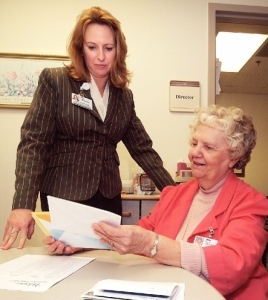Archer named North Carolina's top volunteer director
By Phyllis Moore
Published in News on April 25, 2011 1:46 PM

News-Argus/MICHAEL K. DAKOTA
Donna Archer, left, director of volunteer services at Wayne Memorial Hospital, discusses incoming patient mail with volunteer Peggy Scroggs. Mrs. Archer was recently named the first recipient of the Outstanding Volunteer Director for North Carolina by the Governor's Commission on Volunteerism and Community Service.
Donna Archer didn't start out with aspirations to be responsible for a group of volunteers, but it's turned out to be her calling.
Mrs. Archer was recently named first recipient of the Outstanding Volunteer Director for North Carolina by the Governor's Commission on Volunteerism and Community Service. She will be recognized at ceremonies in Raleigh later this month.
Admittedly surprised by the acknowledgment, she said she is most appreciative because it recognizes the vital role volunteer services play in any organization.
"Thinking of a hospital, the doctors and the nurses make a difference, but the volunteers do make a difference, too," she said. "They do the little things that make people feel good."
The director of volunteer services at Wayne Memorial Hospital since 2002 actually began working at the hospital 21 years ago, first as a transcriptionist and then administrative assistant for her now-predecessor Lynn Edgerton.
She was also attending college full-time and said she is embarrassed to admit that when the offer came to assist in the volunteer office, she initially thought, "This job will be easier."
How wrong she was.
The office is one of perpetual motion -- sifting through countless applications, interviewing potential volunteers, matching them with the right assignments. And unlike other organizations which simply accept the extra sets of hands, health care has stricter criteria it must follow.
"We have to go through quite a few hoops and steps," she said. "We do criminal background checks, we check references ... do a half-day orientation on hospital policies and procedures and expectations, then do department-specific training."
Volunteers can work four hours a week, four hours a month, even 20 hours a week, she said. It's up to the person and their commitment level. And even though there is no paycheck at the end of the shift, don't underestimate the part each plays in patient care at the hospital, Mrs. Archer said.
"I think our volunteers appreciate that more than the staff does because they have been there," she said. "The majority of our volunteers are 55-plus and that generation, they're hard-working, just have the strongest work ethic, willingness, dedication and they know that it's the little bitty things that make a difference."
Her promotion to the role she now holds almost didn't happen, though. Upon completing her college education, she accepted a teaching position.
"The day I agreed to it verbally, (Lynn) called me and said, 'I need you not to take that job,' asking me to trust her," Mrs. Archer said. "And I turned down the job. It was just a gut feeling."
Two weeks later, Mrs. Edgerton announced she was moving to South Carolina.
Mrs. Archer has never regretted her decision.
"This job was God-driven because I did not pursue this, I didn't anticipate my being in the position," she said. "But I'm so grateful.
"I love my job because I work with people all day that want to be here, that choose to be here. It's a difficult job in a lot of ways because you're trying to get somebody to do something and you're not giving a paycheck. That's a struggle unto itself -- you're trying to get somebody to do something out of the kindness of their heart."
And kindness is often the operative word.
In a hospital setting, people can be at their most vulnerable, emotions running high as family members are in surgery or ICU.
That's why a large number of volunteers serve in information capacities -- the admitting desk, gift shop, various waiting rooms.
"We have a lot of waiting areas for volunteers -- day surgery, endoscopy, ICU," Mrs. Archer said. "They bridge the gap between the medical staff and families."
"We're trying to move into more clinical areas," she said. "Second floor agreed to accept a clinical volunteer to see if (patients) need a blanket, something to drink. It frees up nurses to deal with the medical part.
"I know that the medical staff and the nursing staff are there to do that stuff but they really don't have that time. If that patient wants to talk, the volunteer can take the time to talk."
On average, she is responsible for 120 volunteers who serve year-round, as well as another 40 students in the summer. An estimated 70 percent of her core group are 60 years old or older, she pointed out, with many of them returning year after year.
"I don't have a huge family but now I have a tremendously huge extended family," she said of the relationships that have been built among the volunteers. "I feel like I have 120 moms and dads and that's really a good feeling."
She also praised her assistant, Sheryl Braswell.
"She understood volunteerism, what it takes to encourage the volunteers, motivate the volunteers," Mrs. Archer said.
